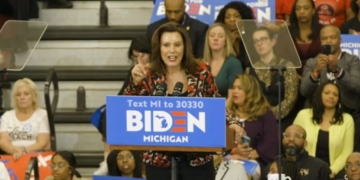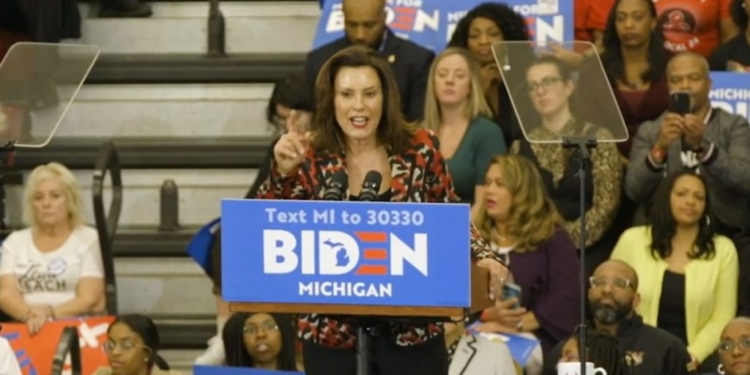Democratic Michigan Gov. Gretchen Whitmer’s multi-billion dollar effort to lure electric vehicle (EV)-related factories to the state has not produced the thousands of jobs she promised, according to an analysis conducted by Bridge Michigan.
Whitmer and the state government have already spent $1 billion of the $2 billion pledged to five different projects to build EV battery factories or expand EV production, but only about 200 jobs have been created, a far cry from the 12,000 jobs Whitmer has stated the companies will ultimately provide for Michiganders, according to Bridge Michigan, a Michigan-focused nonprofit publication of the Center for Michigan. Two years after the subsidies were extended in 2022, only 2% of the jobs promised have been delivered while the state-backed projects have downsized relative to original plans or faced delays.
The companies that are to receive the $2 billion in pledged funds include Ford, LG Energy Solution, Our Next Energy and General Motors. Also included is Gotion, the subsidiary of a China-based company that has significant ties to the Chinese Communist Party, which the Daily Caller News Foundation has covered extensively.
Gretchen Whitmer Raked In Over $1 Million From Billionaires, Celebrity Donors While Attacking Her GOP Opponent’s ‘Special Interests’ Tieshttps://t.co/CVg8yOBFig
— Daily Caller (@DailyCaller) August 15, 2022
Each of the projects is now off schedule, and scale reductions have cut the best-case scenario for job creation by 13%, according to Bridge Michigan. However, the Michigan Economic Development Corporation (MEDC), which has played a key role in providing the subsidies, is still confident that its efforts will provide considerable benefits to Michiganders.
“While there has been some re-scoping, we are still talking about billions of dollars being injected into the state and thousands of jobs being created,” Otie McKinley, a spokesperson for MEDC, told Bridge Michigan.
General Motors has so far received about $468 million of the state’s total pledged boost of $600 million to build an EV battery factory and expand EV production at a separate Michigan plant, according to Bridge Michigan. Whitmer and other proponents touted projections that the developments would cumulatively create 4,000 jobs, but so far there have only been 120 jobs created between the two projects.
Both General Motors projects were supposed to be completed and open this year, but construction remains ongoing at both sites, according to Bridge Michigan. LG Energy Solution’s planned facility in Michigan is the only of the five examined by Bridge Michigan that has yet to receive a large, up-front check from the state to facilitate its efforts.
Our Next Energy received $78.3 million from the state to build a massive EV battery factory and bring $1.6 billion of investment into Michigan, with the company initially saying that the factory would generate more than 2,100 new jobs, according to Michigan Bridge. However, the company has about 50 workers staffing its Wayne County project and has terminated 25% of its employees.
Michigan has also spent $70 million to purchase land for the Ford and Gotion projects, but officials did not “explicitly disclose” those payments, according to Michigan Bridge. Further, the state has already extended loans worth $51 million and spent an additional $600 million on utility hookups and other equipment for the same two developments, Michigan Bridge discovered through public records requests.
Ford’s facility in the state’s southwest “is still under construction; production at the site is scheduled to start, on time, in 2026,” a spokesperson for the company told the DCNF. “Last November, we said that the scale of the project, including job creation, was being reduced. Accordingly, it’s reasonable to expect that the State of Michigan’s support, when announced, will be smaller.”
The spokesperson characterized questions about the facility’s future as “premature, at best.”
The state’s support for the projects is intended to prepare Michigan to maintain its status as the center of America’s auto industry through the transition to EVs, which the Biden administration is facilitating with stringent regulations, according to Bridge Michigan. At the time that the subsidies were conceived and offered, state officials were concerned about the decisions by Ford and General Motors to establish factories in right-to-work states like Kentucky and Tennessee, prompting the push to open up the subsidy floodgates.
If the projects were to never be completed or are completed at a reduced scale, new rules and regulations will likely make it challenging for the state to recover subsidy funds, Bridge Michigan also found. Formerly, companies would have to create jobs first before receiving government cash, but the rules governing the Strategic Outreach and Attraction Reserve (SOAR) — an economic development fund established by the legislature in 2022 — allow for companies to receive state subsidies after they have passed other milestones, like arranging private financing or acquiring machinery.
Green energy and related initiatives have emerged as major parts of Whitmer’s agenda during her tenure as governor. In November 2023, Whitmer signed the Clean Energy and Jobs Act into law, committing Michigan to reaching 100% green energy generation by 2040, and also including language that allows the state’s utility regulator to override local governments to site green energy infrastructure.
Whitmer’s office, the MEDC, General Motors, Gotion, Our Next Energy and LG Energy Solution did not respond immediately to requests for comment.
Featured image credit. (Screen Capture/MLive)
All content created by the Daily Caller News Foundation, an independent and nonpartisan newswire service, is available without charge to any legitimate news publisher that can provide a large audience. All republished articles must include our logo, our reporter’s byline and their DCNF affiliation. For any questions about our guidelines or partnering with us, please contact [email protected].



























 Continue with Google
Continue with Google